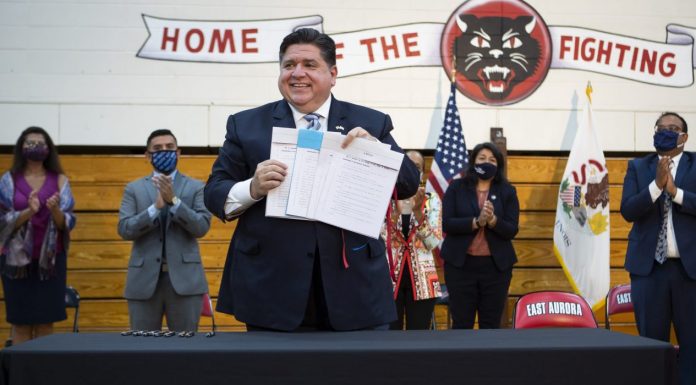Illinois will effectively end immigrant detention and further restrict local law enforcement’s ability to cooperate with federal immigration authorities under a plan Gov. J.B. Pritzker signed into law Monday.
The new law targets local government agreements with U.S. Immigration and Customs Enforcement allowing jails to house immigrant detainees awaiting court hearings. Current contracts must end by January 2022 and new agreements are prohibited.
Currently, three Illinois counties—Kankakee, Pulaski and McHenry—have such agreements at local jails and house roughly 260 immigrant detainees overall, according to ICE.
“Every family, every child, every human being deserves to feel safe and secure in the place that they call home,” Pritzker said at an event in Aurora where he signed several other immigration-related measures.
The measure likely ends the federal agency’s power to detain immigrants in Illinois.
Most detainees in ICE custody nationwide are held in privately run facilities. The agency owns and operates only a handful of its own detention centers, and none exist in Illinois. The state barred private detention in 2019 following several failed attempts to build a new facility near Chicago.
In recent years, other states and cities have pulled back from local agreements to house immigrant detainees, including in California and Washington. States’ efforts to outlaw private detention have also grown amid a lack of federal immigration reform.
Unless there’s a legal challenge or other exception, ICE’s options are to either transfer current detainees in Illinois to other states or release them. Agency officials have repeatedly declined comment on the Illinois plan. An ICE spokeswoman didn’t return a message left Monday.
Immigrant rights activists plan to push for the detainees’ release, saying incarcerating people awaiting immigration proceedings is inhumane and costly. However, some local leaders say they’ll lose much-needed revenue and necessary cooperation with federal authorities.
In McHenry County, the agreement with ICE brings in roughly $10 million each year, according to board Chairman Michael Buehler. It’s a significant chunk of money for the northern Illinois county with a roughly $200 million annual budget.
“It would affect dozens of jobs and negatively impact services,” he said. When asked if the county would fight the new law, he said county officials were “exploring options.”
The new law also goes a step further than a 2017 statewide sanctuary protection measure signed by Republican former Gov. Bruce Rauner.
Among other things, it strictly limits local police interactions with immigration agents unless there’s a criminal warrant and restricts ICE access to police facilities and equipment. It also gives the state attorney general’s office the authority to investigate purported violations of the law.
The other newly-signed laws include creating a task force to assess how state policies and services affect immigrants.
Adapted from reporting by the Associated Press

